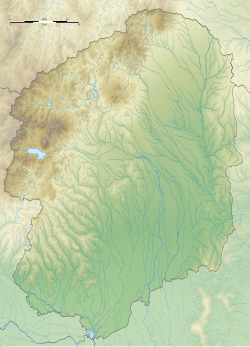Sano Castle: Difference between revisions
No edit summary |
leave two blank lines between the first stub template and whatever precedes it per WP:STUBSPACING |
||
| (25 intermediate revisions by 14 users not shown) | |||
| Line 1: | Line 1: | ||
{{Infobox military structure |
|||
| ⚫ | |||
| name = Sano Castle |
|||
| ⚫ | |||
| nativename-a={{lang|ja|佐野城}} |
|||
| ⚫ | |||
| partof = |
|||
| location = [[Sano, Tochigi|Sano]], [[Tochigi Prefecture]], [[Japan]] |
|||
| image =Sano_Shiroyama_Park.JPG |
|||
| image_size = |
|||
| caption =Sano Castle Park |
|||
|map_type = Japan Tochigi Prefecture#Japan |
|||
|map_size = |
|||
|map_caption = |
|||
|map_relief = 1 |
|||
| type = [[Japanese castle|Hirayama-style castle]] |
|||
| height = |
|||
| ownership = {{ill|Sano clan|WD=Q11385058}} |
|||
| controlledby = |
|||
| condition = ruins |
|||
| built = 1602 |
|||
| builder = {{ill|Sano Nobuyoshi|WD=Q11384947}} |
|||
| used = |
|||
| materials = |
|||
| demolished = 1614 |
|||
| battles = |
|||
| past_commanders = |
|||
| garrison = |
|||
| occupants = |
|||
| events = |
|||
| coordinates = |
|||
}} |
|||
| ⚫ | |||
for the two castles during the [[Edo period]]. |
|||
| ⚫ | |||
| ⚫ | |||
Some historians say that when the Emperor realised that Karasawayama Castle looked down on Edo, he told the Sano clan that there was a law against this. |
Some historians say that when the Emperor realised that Karasawayama Castle looked down on Edo, he told the Sano clan that there was a law against this. |
||
In the same year of the fire, 1602, the Sano clan, rebuilt another new castle at a lower point on the hill - this castle was named Sano Castle. |
In the same year of the fire, 1602, the Sano clan, rebuilt another new castle at a lower point on the hill - this castle was named Sano Castle. |
||
<ref>"Karasawayama Castle" J castle http://www.jcastle.info/castle/profile/95-Karasawayama-Castle |
<ref>"Karasawayama Castle" J castle http://www.jcastle.info/castle/profile/95-Karasawayama-Castle</ref> |
||
Sano Castle itself only existed for a short period of time, and was a less substantial castle than its predecessor. It was built in 1602. However, after the clan moved there from their old castle, the clan became involved in the political conflict of the [[Shogunate]] and were expelled, like many other non hereditary lords in [[Kantō region]] (e.g. the [[Satomi]] clan and [[Minagawa]] clans). As a result of this, their lands were seized and they were forced to abandon it in 1614. |
|||
<ref>"Karasawayama Castle" Japancastle http://www.japancastle.jp/2014/06/Karasawayama-castle.html</ref> |
|||
It was unoccupied after that, and fell into ruin.<ref>"Sano Castle" J castle http://www.jcastle.info/castle/profile/96-Sano-Castle</ref><ref>Sano City Tour guide - website http://www.sano-kankokk.jp/tour_guide/atrct/tg_atrct_005.html</ref> |
|||
== Present site == |
== Present site == |
||
There is little on the present site except for three baileys indicating the footprint of the castle. |
There is little on the present site except for three baileys, indicating the footprint of the castle.<ref>"Sano Castle" Castle Japan http://castle.jpn.org/en/shimotsuke/sano/1.html</ref> |
||
== References == |
== References == |
||
{{Reflist}} |
|||
{{coord|36.3191|139.5791|type:landmark_region:JP|display=title}} |
|||
[[Category:Castles in Tochigi Prefecture]] |
|||
{{castle-stub}} |
|||
Latest revision as of 15:22, 17 November 2023
| Sano Castle | |
|---|---|
佐野城 | |
| Sano, Tochigi Prefecture, Japan | |
 Sano Castle Park | |
| Type | Hirayama-style castle |
| Site information | |
| Owner | Sano clan |
| Condition | ruins |
| Site history | |
| Built | 1602 |
| Built by | Sano Nobuyoshi |
| Demolished | 1614 |
Little is known of Sano Castle (佐野城, Sano-jō). It is mostly connected to its nearby castle, Karasawa Castle, both of which were next to Sano, the corresponding castle town for the two castles during the Edo period. The Sano Clan had previously built Karasawayama Castle, which had been established since the 1400s. In 1602, there was a great fire in Edo castle, which could be seen from Karasawayama Castle. The Sano clan sent their condolences to the Emperor. Some historians say that when the Emperor realised that Karasawayama Castle looked down on Edo, he told the Sano clan that there was a law against this. In the same year of the fire, 1602, the Sano clan, rebuilt another new castle at a lower point on the hill - this castle was named Sano Castle. [1]
Sano Castle itself only existed for a short period of time, and was a less substantial castle than its predecessor. It was built in 1602. However, after the clan moved there from their old castle, the clan became involved in the political conflict of the Shogunate and were expelled, like many other non hereditary lords in Kantō region (e.g. the Satomi clan and Minagawa clans). As a result of this, their lands were seized and they were forced to abandon it in 1614. [2]
It was unoccupied after that, and fell into ruin.[3][4]
Present site
[edit]There is little on the present site except for three baileys, indicating the footprint of the castle.[5]
References
[edit]- ^ "Karasawayama Castle" J castle http://www.jcastle.info/castle/profile/95-Karasawayama-Castle
- ^ "Karasawayama Castle" Japancastle http://www.japancastle.jp/2014/06/Karasawayama-castle.html
- ^ "Sano Castle" J castle http://www.jcastle.info/castle/profile/96-Sano-Castle
- ^ Sano City Tour guide - website http://www.sano-kankokk.jp/tour_guide/atrct/tg_atrct_005.html
- ^ "Sano Castle" Castle Japan http://castle.jpn.org/en/shimotsuke/sano/1.html
36°19′09″N 139°34′45″E / 36.3191°N 139.5791°E


